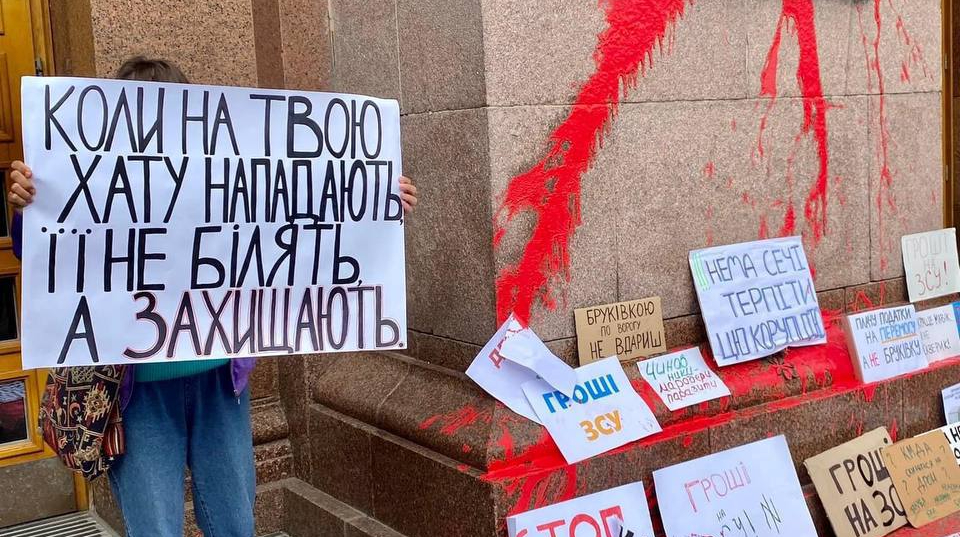“ 90% of Ukrainians believe that the government should be criticized even during the war – this is 8 percentage points more than it was in May 2024. Source: survey results of the Kyiv International Institute of Sociology, conducted from September 19 to October 5. Literally, sociologists: “Only 8% of Ukrainians believe that the government cannot be criticized at all (and the share of those who think so has decreased from 13% since 2024). Instead, 90% agree that criticism of the government should be present (an increase from 81% compared to 2024).” Details: The majority of respondents (58% of this 90%) believe that criticism should be “considered and constructive, so as not to destabilize the situation in the country.” A third (32%) are convinced that criticism should be harsh and uncompromising. KMIS infographic “Compared to 2024, the share of those who insist on harsh criticism has not changed, and the share of those who insist on constructive criticism has increased,” KMIS noted. Sociologists also emphasize that as of the beginning of October 2025, 56% of Ukrainians believe that there are real attempts to fight corruption in Ukraine. At the same time, 40% are convinced that Ukraine is hopelessly corrupt. KMIS infographic KMIS points out that between 2024 and 2025 the perception of the fight against corruption improved, although the indicators remain slightly worse than in 2023, when 59% were optimistic about the fight against corruption in Ukraine and 36% considered the country hopelessly corrupt. Among those who believe that Ukraine is hopelessly corrupt, 45% insist on uncompromising criticism of the government, while 46% are in favor of constructive criticism, and 8% are against criticism in general. KMIS infographic The study lasted from September 19 to October 5. 1,008 respondents over the age of 18, who at the time of the survey lived in the territory of Ukraine, which was controlled by the government of Ukraine, were interviewed by the method of telephone interviews based on a random sample of mobile numbers. The sample did not include residents of territories temporarily not controlled by the authorities of Ukraine (at the same time, part of the respondents are IDPs who moved from the occupied territories), and the survey was not conducted with citizens who went abroad after February 24, 2022. Formally, under normal circumstances, the statistical error of such a sample (with a probability of 0.95 and taking into account the design effect of 1.3) did not exceed 4.1% for indicators close to 50%, 3.5% for indicators close to 25%, 2.5% for indicators close to 10%, 1.8% for indicators close to 5%. Under the conditions of war, in addition to the specified formal error, a certain systematic deviation is added, but sociologists believe that the obtained results still retain high representativeness and allow a fairly reliable analysis of the public mood of the population.”, — write: www.pravda.com.ua
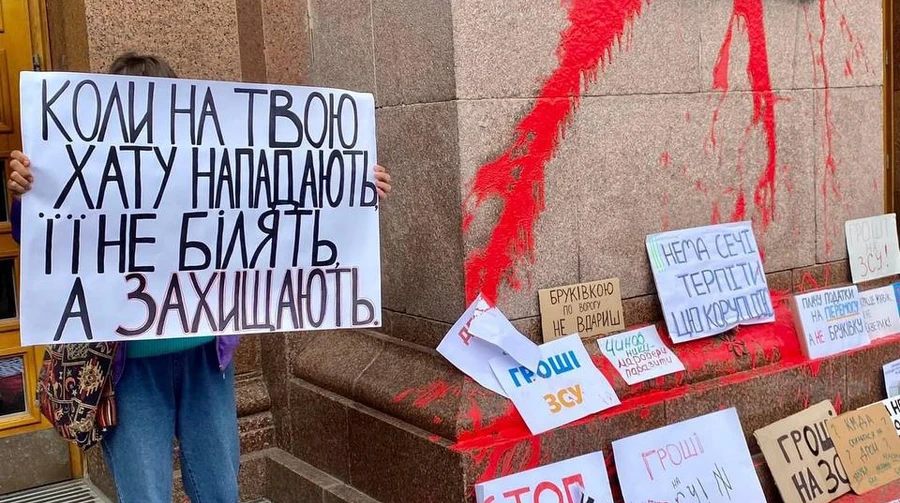 Protest action under KMDA in 2023. People demanded to stop “laundering” money in tenders and direct it to the Armed Forces of Ukraine. Photo by kyiv.comments.ua
Protest action under KMDA in 2023. People demanded to stop “laundering” money in tenders and direct it to the Armed Forces of Ukraine. Photo by kyiv.comments.ua Source: the results of the survey of the Kyiv International Institute of Sociology, conducted from September 19 to October 5
Literally sociologists: “Only 8% of Ukrainians believe that the government should not be criticized at all (and the share of those who think so has decreased from 13% since 2024). Instead, 90% agree that criticism of the government should be present (an increase from 81% compared to 2024).”
Advertising:
Details: The majority of respondents (58% of these 90%) believe that criticism should be “considered and constructive, so as not to destabilize the situation in the country.” A third (32%) are convinced that criticism should be harsh and uncompromising.
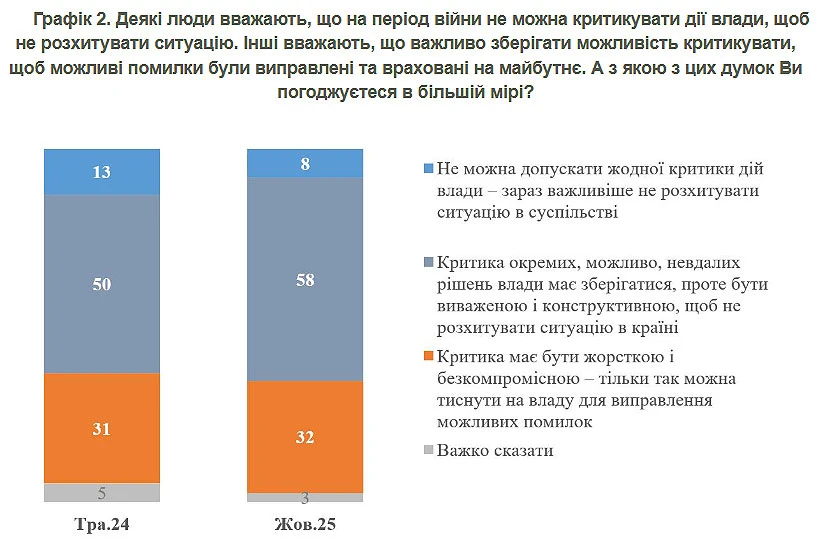 KMIS infographics
KMIS infographics“Compared to 2024, the share of those who insist on harsh criticism has not changed, and the share of those who insist on constructive criticism has increased,” KMIS noted.
Sociologists also emphasize that as of the beginning of October 2025, 56% of Ukrainians believe that there are real attempts to fight corruption in Ukraine.
At the same time, 40% are convinced that Ukraine is hopelessly corrupt.
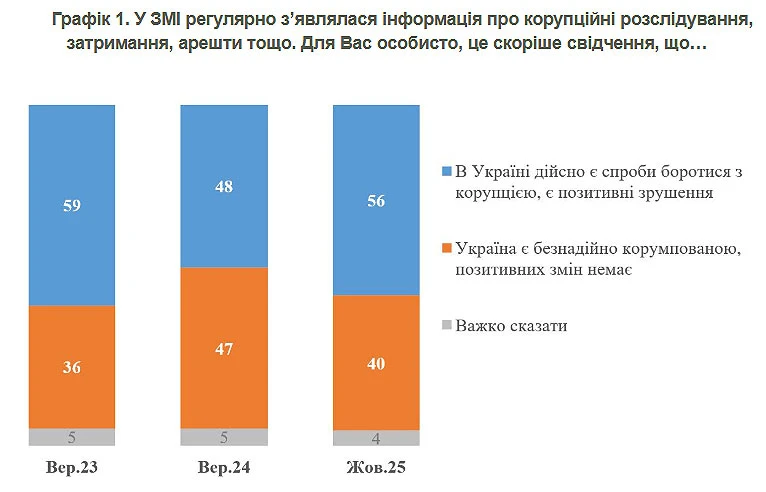 KMIS infographics
KMIS infographicsKMIS emphasizes that between 2024 and 2025, the perception of the fight against corruption improved, although the indicators remain slightly worse than in 2023, when 59% were optimistic about the fight against corruption in Ukraine and 36% considered the country hopelessly corrupt.
Among those who believe that Ukraine is hopelessly corrupt, 45% insist on uncompromising criticism of the government, while 46% are in favor of constructive criticism, and 8% are against criticism in general.
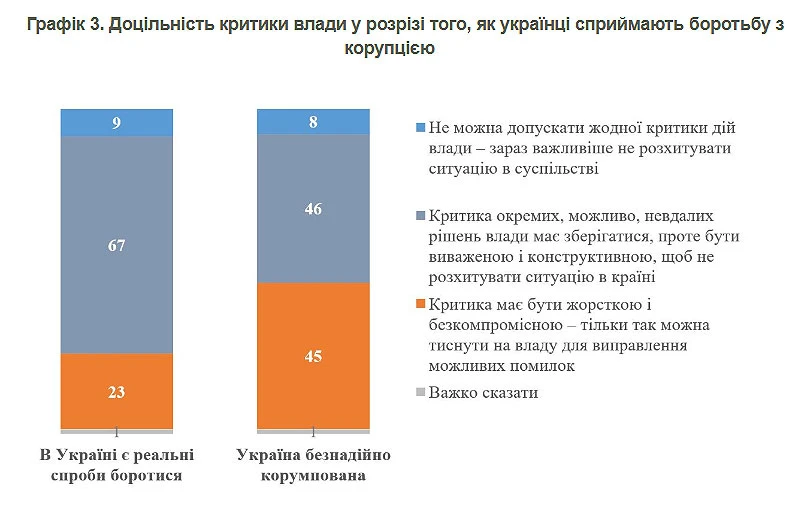 KMIS infographics
KMIS infographicsThe research lasted from September 19 to October 5. 1,008 respondents over the age of 18, who at the time of the survey lived in the territory of Ukraine, which was controlled by the government of Ukraine, were interviewed by the method of telephone interviews based on a random sample of mobile numbers. The sample did not include residents of territories temporarily not controlled by the authorities of Ukraine (at the same time, part of the respondents are IDPs who moved from the occupied territories), and the survey was not conducted with citizens who went abroad after February 24, 2022.
Formally, under normal circumstances, the statistical error of such a sample (with a probability of 0.95 and taking into account the design effect of 1.3) did not exceed 4.1% for indicators close to 50%, 3.5% for indicators close to 25%, 2.5% for indicators close to 10%, 1.8% for indicators close to 5%.
Under the conditions of war, in addition to the specified formal error, a certain systematic deviation is added, but sociologists believe that the obtained results still retain high representativeness and allow a fairly reliable analysis of the public mood of the population.
